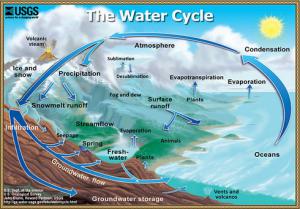Water securityWater cycle instability posing major political and economic risks: UN experts
The current instability and unpredictability of the world water cycle is here to stay, making society’s adaptation to new risks a vital necessity when formulating development policies, a UN water expert warns. “What we haven’t understood until now is the extent to which the fundamental stability of our political structures and global economy are predicated on relative stability and predictability of the water cycle — that is, how much water becomes available in what part of the year. As a result of these new water-climate patterns, political stability and the stability of economies in most regions of the world are now at risk,” the expert says.

Schematic rendering of normal water cycle // Source: usgs.gov
The current instability and unpredictability of the world water cycle is here to stay, making society’s adaptation to new risks a vital necessity when formulating development policies, a UN water expert warns.
Robert Sandford, the EPCOR Chair for Water and Climate Security at the United Nations University’s Canadian-based Institute for Water, Environment and Health (UNU-INWEH), says long-term water cycle stability “won’t return in the lifetime of anyone alive today.”
“What we haven’t understood until now is the extent to which the fundamental stability of our political structures and global economy are predicated on relative stability and predictability of the water cycle — that is, how much water becomes available in what part of the year. As a result of these new water-climate patterns, political stability and the stability of economies in most regions of the world are now at risk.”
The UN University notes that Ontario Lieutenant-Governor Elizabeth Dowdeswell, a former Executive Director of the UN Environment Programme, and UN Under Secretary-General David Malone, Rector of UN University, were among several expert speakers joining Sandford in Ottawa Tuesday 5 April at UNU-INWEH’s day-long twentieth anniversary public seminar, “Water: The Nexus of Sustainable Development and Climate Change.”
The seminar focused on national policy changes needed worldwide to achieve global water security — a pre-requisite for reaching the new global Sustainable Development Goals, or SDGs, agreed upon by world leaders in September 2015.
“Water is the most precious and increasingly scarce resource of many developing countries, including several of the largest among them,” says Dr. Malone. “Their growing populations can’t do without it, indeed need more of it all the time, while climate change has made supply even more unpredictable and unreliable than in the past. The issue of water supply and quality is existential for much of the developing world, and touches on most of the Sustainable Development Goals agreed last year at the UN.”
Dowdeswell commented: “Canada has contributed an impressive number of ideas and individuals to the resolution of global environmental challenges. UNU-INWEH continues to mobilize thought leaders to turn ideals and agreements into action. Our common vulnerability must be met with courage and boldness.”
“Our research,” adds Zafar Adeel, Director of UNU-INWEH, “shows that achieving the water-related SDGs represents an expeditious and cost effective way to arrive at sustainable development and societies that are resilient to climate change impacts.”
